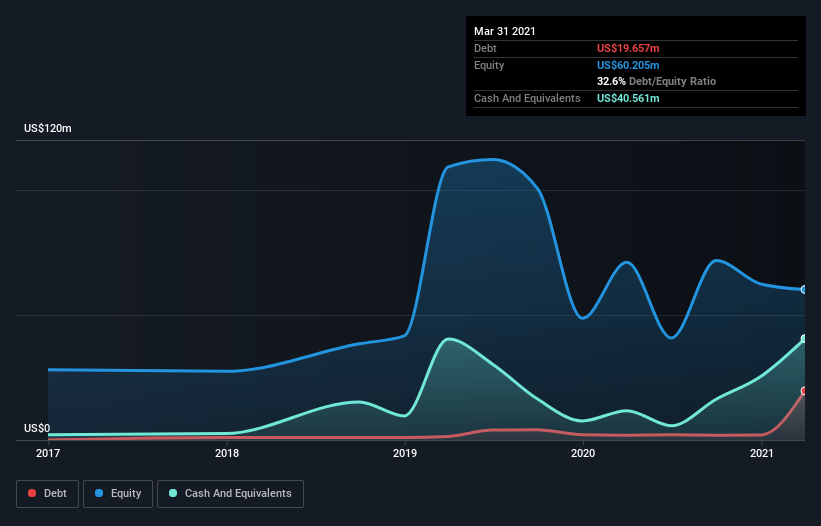Health Check: How Prudently Does Goodness Growth Holdings (CSE:GDNS) Use Debt?
Some say volatility, rather than debt, is the best way to think about risk as an investor, but Warren Buffett famously said that 'Volatility is far from synonymous with risk.' When we think about how risky a company is, we always like to look at its use of debt, since debt overload can lead to ruin. We note that Goodness Growth Holdings, Inc. (CSE:GDNS) does have debt on its balance sheet. But is this debt a concern to shareholders?
When Is Debt Dangerous?
Debt is a tool to help businesses grow, but if a business is incapable of paying off its lenders, then it exists at their mercy. Part and parcel of capitalism is the process of 'creative destruction' where failed businesses are mercilessly liquidated by their bankers. While that is not too common, we often do see indebted companies permanently diluting shareholders because lenders force them to raise capital at a distressed price. Of course, the upside of debt is that it often represents cheap capital, especially when it replaces dilution in a company with the ability to reinvest at high rates of return. The first step when considering a company's debt levels is to consider its cash and debt together.
View our latest analysis for Goodness Growth Holdings
What Is Goodness Growth Holdings's Net Debt?
As you can see below, at the end of March 2021, Goodness Growth Holdings had US$19.7m of debt, up from US$1.95m a year ago. Click the image for more detail. However, its balance sheet shows it holds US$40.6m in cash, so it actually has US$20.9m net cash.

How Strong Is Goodness Growth Holdings' Balance Sheet?
We can see from the most recent balance sheet that Goodness Growth Holdings had liabilities of US$24.1m falling due within a year, and liabilities of US$39.1m due beyond that. Offsetting these obligations, it had cash of US$40.6m as well as receivables valued at US$1.07m due within 12 months. So its liabilities total US$21.6m more than the combination of its cash and short-term receivables.
Of course, Goodness Growth Holdings has a market capitalization of US$210.9m, so these liabilities are probably manageable. But there are sufficient liabilities that we would certainly recommend shareholders continue to monitor the balance sheet, going forward. While it does have liabilities worth noting, Goodness Growth Holdings also has more cash than debt, so we're pretty confident it can manage its debt safely. The balance sheet is clearly the area to focus on when you are analysing debt. But it is future earnings, more than anything, that will determine Goodness Growth Holdings's ability to maintain a healthy balance sheet going forward. So if you're focused on the future you can check out this free report showing analyst profit forecasts.
Over 12 months, Goodness Growth Holdings reported revenue of US$50m, which is a gain of 39%, although it did not report any earnings before interest and tax. Shareholders probably have their fingers crossed that it can grow its way to profits.
So How Risky Is Goodness Growth Holdings?
Statistically speaking companies that lose money are riskier than those that make money. And the fact is that over the last twelve months Goodness Growth Holdings lost money at the earnings before interest and tax (EBIT) line. Indeed, in that time it burnt through US$26m of cash and made a loss of US$22m. With only US$20.9m on the balance sheet, it would appear that its going to need to raise capital again soon. Goodness Growth Holdings's revenue growth shone bright over the last year, so it may well be in a position to turn a profit in due course. By investing before those profits, shareholders take on more risk in the hope of bigger rewards. When analysing debt levels, the balance sheet is the obvious place to start. But ultimately, every company can contain risks that exist outside of the balance sheet. For instance, we've identified 4 warning signs for Goodness Growth Holdings (1 shouldn't be ignored) you should be aware of.
When all is said and done, sometimes its easier to focus on companies that don't even need debt. Readers can access a list of growth stocks with zero net debt 100% free, right now.
If you're looking for stocks to buy, use the lowest-cost* platform that is rated #1 Overall by Barron’s, Interactive Brokers. Trade stocks, options, futures, forex, bonds and funds on 135 markets, all from a single integrated account. Promoted
New: Manage All Your Stock Portfolios in One Place
We've created the ultimate portfolio companion for stock investors, and it's free.
• Connect an unlimited number of Portfolios and see your total in one currency
• Be alerted to new Warning Signs or Risks via email or mobile
• Track the Fair Value of your stocks
This article by Simply Wall St is general in nature. It does not constitute a recommendation to buy or sell any stock, and does not take account of your objectives, or your financial situation. We aim to bring you long-term focused analysis driven by fundamental data. Note that our analysis may not factor in the latest price-sensitive company announcements or qualitative material. Simply Wall St has no position in any stocks mentioned.
*Interactive Brokers Rated Lowest Cost Broker by StockBrokers.com Annual Online Review 2020
Have feedback on this article? Concerned about the content? Get in touch with us directly. Alternatively, email editorial-team (at) simplywallst.com.
About CNSX:VREO
Vireo Growth
Operates as a cannabis company that cultivates, manufactures, processes, and distributes medical and adult-use cannabis products in Maryland, Minnesota, and New York.
Excellent balance sheet with limited growth.
Similar Companies
Market Insights
Community Narratives



